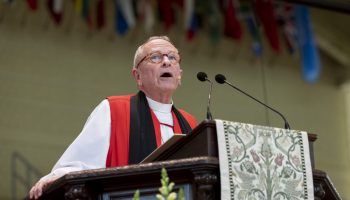Valarie Kaur has been here before.

“Here” isn’t a place, it’s a feeling; the internal struggle of working to sustain both anger and love through years framed by Donald Trump’s presidency, a pandemic and racial violence. But Kaur has been advocating for marginalized people through tumultuous times since the George W. Bush administration, and Gene Robinson, Chautauqua Institution’s Vice President of Religion, said “she has a lot of the good fight left.”
“With recent dark times, especially since Trump came into office, she poses a question about the current darkness: Is this darkness in our country the darkness of the tomb or the darkness of the womb?” Robinson said. “Meaning, is something dying or is something being born from it? I know that gets her through.”
Kaur, civil rights activist, filmmaker, lawyer and founder of the Revolutionary Love Project, will deliver “See No Stranger: The Spiritual and Political Force of Revolutionary Love” at 2 p.m. EDT Thursday, July 30, on the CHQ Assembly Video Platform as a part of the Week Five Interfaith Lecture Series theme, “The Feminine Spirit.”
The Revolutionary Love Project is a production of stories, tools, curricula, conferences, films and mass mobilizations that “equip and inspire people to practice the ethic of love.” The current focus of the project is geared toward reversing racism, nationalism, and hate against Muslim, Arab, South Asian American and Sikh communities.
“I was part of this generation of Sikh advocates who had this frame that if the nation only knew who we were, then it would be enough, then it would stop this tide of hate,” Kaur told the Observer. “But knowing is not enough. We have to be agents of revolutionary love.”
Robinson met Kaur through the Auburn Seminary Senior Fellows program, aimed to connect faith leaders who are committed to “catalyzing and advancing multifaith movements.” Robinson said she was a leader in the effort to allow Sikh citizens to participate in the military while still wearing “emblems of their religion,” such as turbans.
I’ve learned that there’s no such thing as monsters in this world,” she told the Observer. “Loving our opponents is not just a moral call — it’s pragmatic, it is strategic, it is how we learn to fight in ways that don’t just resist bad actors or remove bad actors from power, but actually change the systems, institutions, and cultures in which they operate.”
“She brings so much energy and spirit to everything she advocates for,” he said. “I think people think of the feminine spirit as something soft and gentle and kind and sweet, but she has a way of describing a love ethic that is tough, hard-hitting and powerful.”
Kaur’s 2020 memoir, See No Stranger, is an account of her efforts to learn and live that “revolutionary love ethic.” Her understanding of that ethic began with her family’s American story, specifically that of her paternal grandfather, Kehar Singh. Singh came to the United States in 1913, only to be immediately imprisoned due to the country’s immigration policies. A white immigration attorney, Henry Marshall, helped with Singh’s release and Kaur credits Marshall’s kindness as the reason for her being.
“I’ve learned that there’s no such thing as monsters in this world,” she told the Observer. “Loving our opponents is not just a moral call — it’s pragmatic, it is strategic, it is how we learn to fight in ways that don’t just resist bad actors or remove bad actors from power, but actually change the systems, institutions, and cultures in which they operate.”
Part of loving oneself is allowing a feeling of anger when others harm you. The opposite of love is not anger, but indifference, Kaur told the Observer.
“Especially as a woman of color, I was always taught to be ashamed of my rage, to suppress it down inside of me,” Kaur told the Observer. “It took me a long journey, as you read, to understand that my rage carried information, that it showed me that my body and my life were worth protecting, that I had something worth fighting for.”
Kaur told the Observer she has found hope through the activists who clogged airports to protest Trump’s 2017 Muslim ban, to those who particpated in the 2016 and 2020 Black Lives Matter marches across the globe. With every metaphor of rage and war, she said she returns to metaphors of labor and birth, of new beginnings and a belief that something better is always on the horizon.
“How do we show up to the fire and still breathe and push and breathe and push?” Kaur told the Observer. “It’s true love.”
This program is made possible by the Waasdorp Fund for Religious Initiatives.




